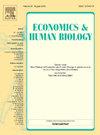Cognitive or non-cognitive? The effect of maternal dominance on adolescent human capital: Evidence from adolescents' educational decisions
IF 2.2
3区 医学
Q2 ECONOMICS
引用次数: 0
Abstract
Using data from the 2014 China Family Panel Studies (CFPS), this study finds that when mothers hold dominant positions in their children's educational decisions, they are more likely to adopt a "tiger mom" approach. This dynamic explains why maternal dominance in educational decisions significantly enhances adolescents' cognitive abilities while hindering their non-cognitive skills. We propose time investment, material investment, and parenting styles as channel variables that offer a more comprehensive explanation. It is clear that as mothers have the decision-making authority in children's education, parents allocate more time to daily care and homework tutoring and provide additional extracurricular learning resources for adolescents, ultimately enhancing their cognitive abilities. Meanwhile, parents tend to be more demanding. Conversely, the mothers' dominance in the children's educational decisions results in reduced investment in leisure time, with no statistically significant effects on parents' responsiveness and activities related to talent development, mental growth, and parent-child bonding. The above three mechanisms indicate that when mothers hold dominant positions in their children's educational decisions, they are more likely to adopt a "tiger mom" approach to fostering their children's human capital development. These findings partially explain the negative effect on adolescents' non-cognitive abilities. In conclusion, these findings underscore the critical role of the tiger mom in shaping adolescents' cognitive and non-cognitive abilities. Efforts should be made to promote the holistic development of adolescents' cognitive and non-cognitive abilities.
认知还是非认知?母亲优势对青少年人力资本的影响:来自青少年教育决策的证据
根据2014年中国家庭调查(CFPS)的数据,该研究发现,当母亲在孩子的教育决策中占据主导地位时,她们更有可能采取“虎妈”的方式。这一动态解释了为什么母亲在教育决策中的主导地位显著提高了青少年的认知能力,同时阻碍了他们的非认知技能。我们提出时间投入、物质投入和养育方式作为渠道变量,提供了更全面的解释。显然,由于母亲在孩子的教育中拥有决策权,父母会为青少年分配更多的日常照顾和家庭作业辅导时间,并为青少年提供额外的课外学习资源,最终提高他们的认知能力。与此同时,父母往往要求更高。相反,母亲在子女教育决策中的主导地位导致闲暇时间的投入减少,对父母的反应性和与人才发展、心理成长和亲子关系相关的活动没有统计学意义的影响。以上三种机制表明,当母亲在子女的教育决策中占据主导地位时,她们更有可能采取“虎妈”的方式来促进子女的人力资本发展。这些发现部分解释了对青少年非认知能力的负面影响。总之,这些发现强调了虎妈在塑造青少年认知和非认知能力方面的关键作用。应努力促进青少年认知和非认知能力的全面发展。
本文章由计算机程序翻译,如有差异,请以英文原文为准。
求助全文
约1分钟内获得全文
求助全文
来源期刊

Economics & Human Biology
医学-公共卫生、环境卫生与职业卫生
CiteScore
4.50
自引率
12.00%
发文量
85
审稿时长
61 days
期刊介绍:
Economics and Human Biology is devoted to the exploration of the effect of socio-economic processes on human beings as biological organisms. Research covered in this (quarterly) interdisciplinary journal is not bound by temporal or geographic limitations.
 求助内容:
求助内容: 应助结果提醒方式:
应助结果提醒方式:


